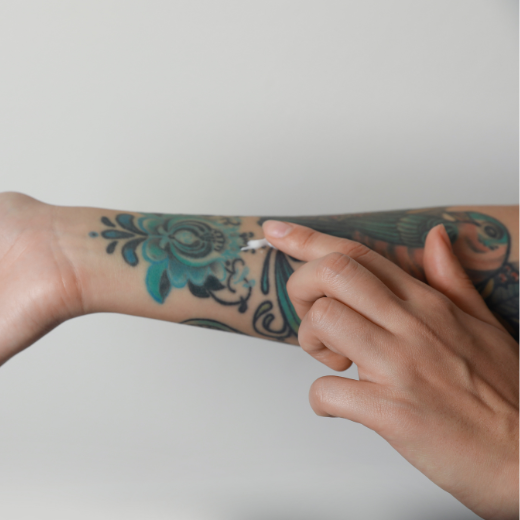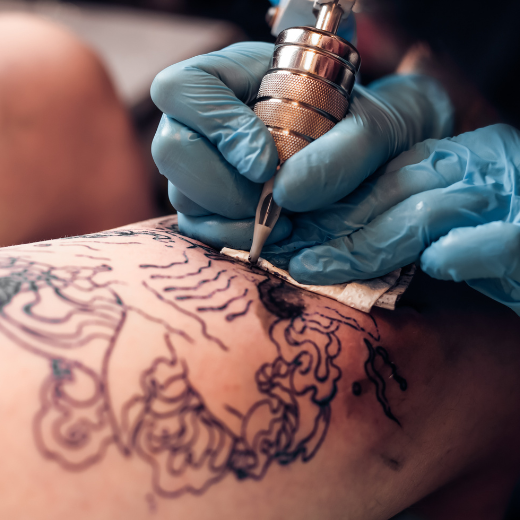Eternal Ink: How to Maximize the Lifespan of Your Tattoos
Posted by Ellie Swain on Apr 28th 2023
You’ve finally got the tattoo you’ve been dreaming of, and you’re in love. But how can you keep your new ink looking fresh and crisp for as long as possible?
Time inevitably takes its toll, but that doesn't mean you can't have a lasting ink masterpiece. If you're keen on maintaining the vibrancy of your tattoo in defiance of time, then keep reading.
The Science of Tattoo Longevity
The appearance and lifespan of a tattoo depend on many factors, including the:
- Type of ink used
- Depth of the ink
- Location of the tattoo
- Your immune system
- How often it’s exposed to sunlight
Black ink is the most durable and longest-lasting of all tattoo inks. It’s also the easiest to remove.
The location of the tattoo also plays a role in how long it will last. Tattoos on areas of the body that experience a lot of wear and tear and exposure to sunlight, such as the hands or feet, don’t tend to remain as vibrant as those on less-used areas, like the back or upper arm.
Additionally, a person’s immune system plays a role in how long a tattoo will last. Those with a weaker immune system may find that their tattoos fade more quickly than others – so here’s another reason to try and live a healthy lifestyle with plenty of exercise and a balanced diet.

Tips and Tricks for Prolonging the Quality of Your Tattoo
Want your beautiful new tattoo to last forever? Here are our top tips and tricks for prolonging the brilliance of your new ink.
Wear SPF 30 or Higher on Your Tattoo
Incorporating sunscreen into your daily routine is one of the most essential tips for prolonging the vividness of your tattoos. The sun’s ultraviolet rays can cause fading and discoloration over time, so it’s vital to protect your ink with a broad-spectrum sunscreen with an SPF of 30 or higher.
There are many great sunscreens on the market, but we love the Murad Essential-C Day Moisture SPF 30. The luxuriously hydrating day cream helps to reveal radiance and shields from UV damage as it revitalizes environmentally-stressed skin.

Avoid Chlorinated Water
Another helpful tip for preserving your tattoos is to avoid prolonged exposure to chlorinated water.
This can cause the colors in your tattoos to bleed and fade, so it’s best to take a quick shower before swimming or limit your time in the pool or hot tub.
Take Care of Your Tattoos During The Healing Process
To keep your tattoos looking their best, it’s also essential to properly care for them during the healing process. During the first month of healing, gently wash the tattooed area with a mild, fragrance-free soap or cleanser and pat it dry. The Osmosis Cleanse - Gentle Cleanser is an excellent option, removing contaminants and balancing the skin.
Once the skin is cleansed, apply a thin layer of tattoo ointment or lotion to keep the area moisturized and protected. Avoid picking or scratching at the tattoo, and don’t expose it to sunlight until it’s fully healed.
Common Myths About Tattoo Care: Debunked
Heard some tattoo aftercare tips you’re not too sure about? We’re here to clear up any common tattoo myths and get the record straight.
You Don't Need to Worry About Aftercare if You Have a Professional-Quality Tattoo
This is one of the most common myths about tattoo care. Many people think that if they get their tattoo from a reputable artist, they don't need to do anything special to care for it.
While this would be convenient, sadly, this isn't true. Even the best quality tattoos need proper care to stay looking their best so they can last a lifetime.

You Can Use Any Old Soap On Your Tattoo
Another common myth is that you can use any old soap on your tattoo. This definitely isn’t the case. You need to use a mild, fragrance-free soap that won't irritate your skin.
It's also essential to rinse all the soap off thoroughly after washing, as leaving any residue can lead to infection.
Your Tattoo Will Be Fine If You Just Let It Air Dry
Tattoos need to be patted dry, not air-dried. If you allow your tattoo to air dry while it’s healing, it can lead to scabbing, which will damage the tattoo and make it harder to heal correctly.
Do you want more skincare advice? Read all about Retinol in Skincare here.

